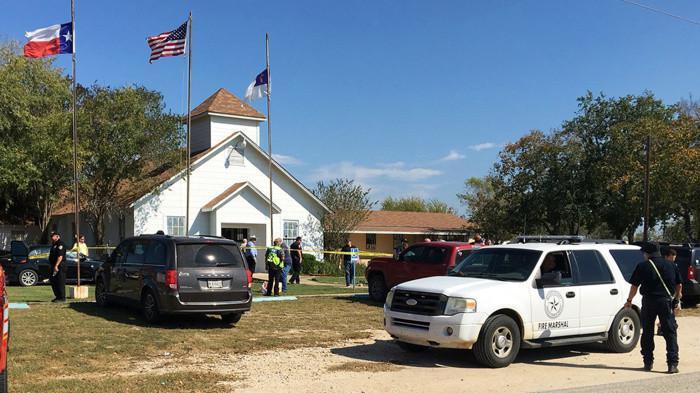
A gunman massacred at least 26 worshipers and wounded 20 others at a white-steepled church in southeast Texas on Nov. 5, carrying out the latest in a series of mass shootings that have plagued the United States, authorities said.
The lone suspect, wearing black tactical gear and a ballistic vest and carrying an assault rifle, opened fire after entering the First Baptist Church in Sutherland Springs in Wilson County, about 65 km east of San Antonio.
The victims ranged in age from 5 to 72 years old, law enforcement officials said at a news conference.
After the shooting, the gunman, described as a white man in his 20s, was fired on by a local resident. He fled in his vehicle and was later found dead in neighboring Guadalupe County.
It was not immediately clear if the suspect killed himself or he was hit by gunfire by the resident, authorities said.
“We are dealing with the largest mass shooting in our state’s history,” Texas Governor Greg Abbott said at the news conference. “The tragedy of course is worsened by the fact that it occurred in a church, a place of worship where these people were innocently gunned down.”
Neither the suspect’s identity nor motive were disclosed by authorities.
But law enforcement officials who were not identified have said the gunman was Devin P. Kelley, describe as a white, 26-year-old man, the New York Times and other media reported.
Meanwhile, U.S. President Donald Trump on Nov. 6 said the mass shooting was due to a “mental health problem” and wasn’t “a guns situation.”
Asked what policies he might support in response to the shooting at a press conference in Tokyo, Trump said that based on preliminary reports, the gunman was “a very deranged individual, a lot of problems.”
“We have a lot of mental health problems in our country, as do other countries. But this isn’t a guns situation,” he said. “Fortunately somebody else had a gun that was shooting in the opposite direction.
“This is a mental health problem at the highest level,” he said. “It’s a very, very sad event.”
The Turkish Foreign Ministry condemned the attack in a statement on Nov. 5.
“We are deeply saddened by the terrorist attack carried out at a church in Texas state claiming tens of lives and leaving many people injured,” the ministry said in a written statement.
“We strongly condemn this attack and wish Allah’s mercy on those who lost their lives and convey our condolences to the people of the U.S.,” it added.
The massacre comes just weeks after a sniper killed 58 people at an outdoor concert in Las Vegas, the deadliest mass shooting in modern U.S. history. The shootings have stirred a years-long national debate over whether easy access to firearms was contributing to the trend.
Meanwhile, five days after the worst attack on New York since September 11, 2001, the city staged a show of defiance on Nov. 5, with some 2.5 million people packing the streets to cheer on 50,000 marathon participants from around the world.
Many who had come to watch spoke of overcoming their fears as New Yorkers proved their resilience in the aftermath of a truck attack that killed eight people and wounded 12 others in Manhattan near the 9/11 Memorial.
Spectators rang bells and held banners, while bands played songs in an atmosphere more festive and louder than ever.
“They didn’t win and we’re here and we’re going to have our marathon and we’re going to cheer,” said Karen Mesnick-Uretsky, who ran the marathon in 2006.
“It’s a lot of pride, not only for New York, but all the countries that came here.”
The city heavily bolstered security for the race, parking massive sand trucks to prevent vehicle attacks, stationing extra police on rooftops and deploying more anti-sniper units.
Hundreds of uniformed officers stood along the route, while plainclothes officers blended in with the crowds of spectators.
Trump insisted in an interview that aired on Nov. 5 that Americans should never accept terrorism as inevitable.
“We cannot just say, ‘Oh well, it’s going to happen, let’s get used to it.’ We cannot allow it to happen,” he said on the Full Measure syndicated television show.
“I can tell you, the Trump administration is getting tougher and tougher and tougher.”
But awareness of the potential threat was a constant during the marathon. In iconic Central Park, where the race ended, a woman’s amplified voice offered a repeated warning even before the race began: “Stay alert at all times.”